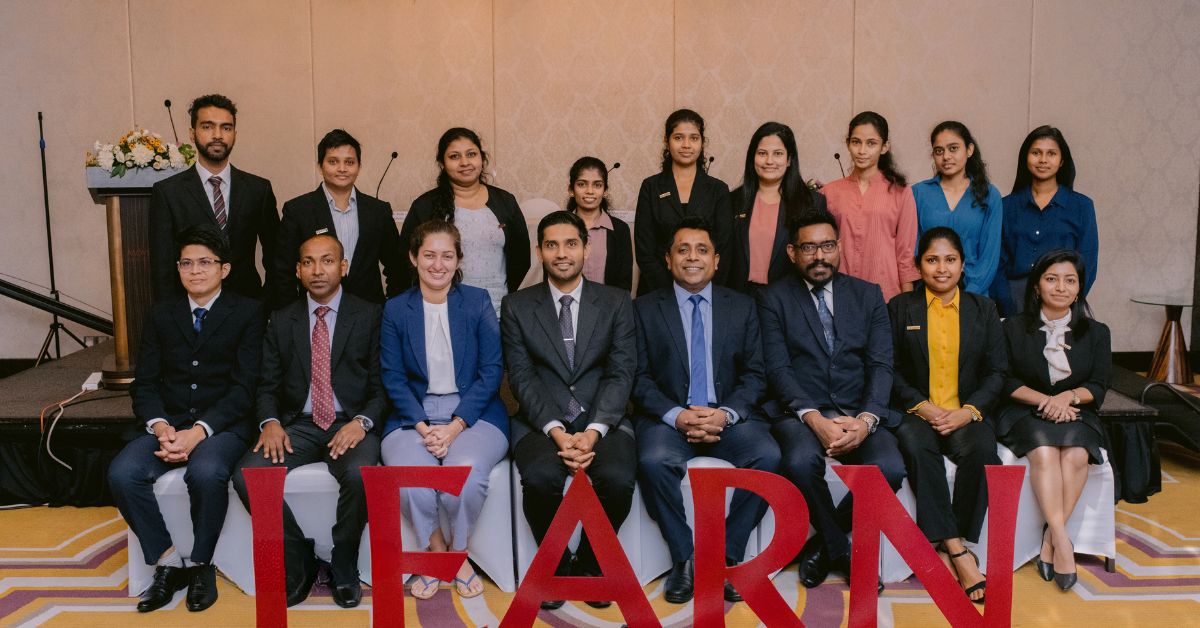Amidst the backdrop of an unprecedented economic crisis, LEARN, Sri Lanka’s National Research and Education Network (NREN), emerged as a beacon of resilience and innovation. Throughout the past year, the organisation navigated around economic struggles while achieving significant milestones. Locally, it collaborated with the Indonesia Cyber Education (ICE) Institute to launch a Massive Open Online Courses (MOOC) platform, continued to provide Zoom accounts at discounted rates, and conducted impactful workshops to enhance academic skills. On the international front, LEARN is a prominent member of APAN and TEIN. Notably, LEARN’s hosting of APAN56 and its contributions to SANOG40 underscored its regional leadership. These initiatives highlighted the organisation’s active participation in regional projects and facilitated knowledge exchange among member institutions. Reflecting on these achievements, LEARN reiterated its dedication to supporting local academics at its Annual General Meeting.
A Brief History of LEARN
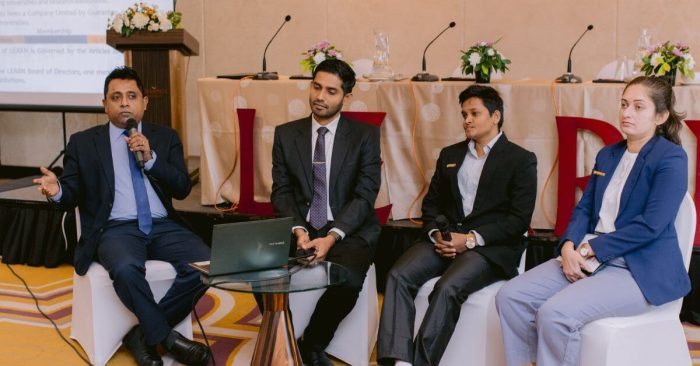
The first was an awareness session that shed light on LEARN’s pivotal efforts in uplifting research and higher education in Sri Lanka. It was moderated by the Consultant CTO of LEARN, Dr. Asitha Bandaranayake, and the speakers consisted of Consultant CEO of LEARN, Prof. Roshan Ragel, Operations Manager at LEARN, Ms. Wathsala Dayananda, and Senior TAC Engineer at LEARN, Ms. Deepthi Gunasekara. Dr. Bandaranayake initiated the session with an introduction to LEARN, underscoring its local and regional achievements as one of the oldest NRENs in South Asia. Notably, among these achievements, the organisation pioneered bringing internet access to Sri Lanka in 1994. Fast forward to 2009, and LEARN was officially incorporated as a Company Limited by Guarantee, owned jointly by the University Grants Commission (UGC) of Sri Lanka and the State Universities. Today, LEARN has 18 full members, 16 associate members, and 25 affiliate members, a testament to its expansive network and influence within the academic community.
Following Dr. Bandaranayake’s introductory remarks, Prof. Ragel elaborated on the NREN’s services and activities to uplift the Sri Lankan research and higher education community. He emphasised that the organisation’s founding objective of connecting universities was towards “Actually connecting people. The end goal was to help academics easily share knowledge and work together.” He underscored the transformative journey of LEARN, wherein connectivity has evolved into something expected akin to an indispensable utility. Hence, the organisation expanded its offerings with an array of services ranging from Learning Management Systems to international research databases, in line with its original mission of empowering Sri Lankan academia. The inherent advantage of NRENs centrally providing such services for member institutions is the economies of scale, which results in lower costs. Subsequently, Ms. Dayananda provided insights into the differences between LEARN’s membership categories – Full members, Associate members, and Affiliate members. Collectively, these categories represent Sri Lanka’s various research and higher education institutions, both in the state and private sector, fostering a collaborative environment enabling innovation.
The Importance of LEARN
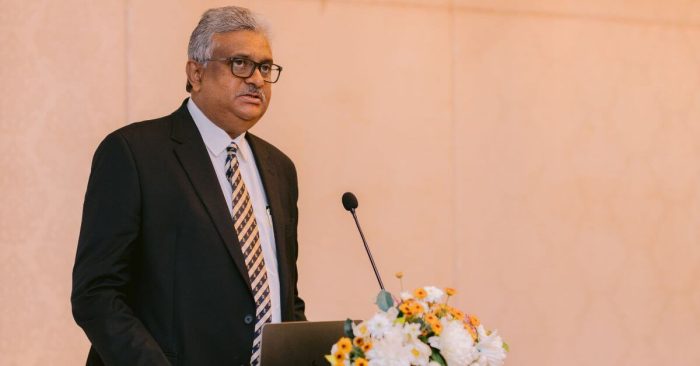
Following the introduction, Dr. Bandaranayake highlighted LEARN’s multifaceted role in facilitating seamless connectivity for Sri Lankan academia. While the organisation holds a licence from the Telecommunications Regulatory Commission of Sri Lanka to operate as an ISP, he emphasised that its offerings go beyond simply offering internet access. Today, the NREN offers direct connections with prominent international research and education entities, including SingAREN, NKN from India, Google, TEIN, and numerous others. These direct links enable Sri Lankan academics to access an extensive suite of tools and collaborate with global counterparts, thereby catalysing research endeavours and fostering innovation, which benefits all of society.
Prof. Ragel expanded upon Dr. Bandaranayake’s ideas, delving into the evolving role of NRENs, particularly concerning research initiatives. He highlighted that while commercial entities may offer basic internet connectivity, research often involves large, time-sensitive data transfers. As a result, specialised infrastructure tailored to research data transmission was developed. Prof. Ragel illustrated the benefits of this infrastructure, explaining that if a Sri Lankan researcher collaborates with a counterpart in Thailand and requires data transfer, relying on commercial internet services would be both slow and costly. Even if a faster link were obtained from a Sri Lankan ISP, it would not suffice as an equally fast link is necessary at the receiving end. Contrasting this, Prof. Ragel shared, “Whereas, we at LEARN can work with our counterparts at ThaiREN and easily increase the links on both sides. Such instances happen quite regularly between our regional counterparts.”
These points were echoed by the Chairman of the UGC, Senior Professor Sampath Amaratunge, who said at the AGM, “LEARN gave its fullest cooperation for the Higher Education system to continue functioning when it struggled.” He also recognised its board of directors representing the VCs of the state universities. Professor Amaratunge argued that critics need to be made aware of the full scope of the organisation. Furthermore, he highlighted that while the UGC is bound to state universities, LEARN can support even non-state universities, which he considers a key benefit for the nation. Recognising the organisation’s technical proficiency, he extended an invitation for LEARN to collaborate on projects undertaken by other UGC bodies. Additionally, Professor Amaratunge endorsed LEARN as the ideal entity to manage the infrastructure of the proposed Virtual University, citing its potential to offer courses aligned with specialised industry requirements.
How LEARN’s Services Empower Sri Lankan Academia
The session then delved into a deep dive into the array of services provided by LEARN, which was explained in detail by Prof. Ragel and Deepthi. From the onset, the NREN’s comprehensive suite of services was tailored to the needs of higher education and research institutions in Sri Lanka. Collectively they encompass virtual resources ranging from international roaming to remote conferencing to research databases. Below is a list of the key services offered by LEARN today:
- LEARN Identity Access Federation (LIAF): It facilitates access to a wide range of resources provided by state universities and LEARN itself. This is made possible through a set of standardised rules and policies that create a trusted environment to authenticate users from its different member institutions. Notably, LIAF’s membership in the global eduGAIN inter-federation enhances its reach, enabling users to access a myriad of global services effortlessly.
- Zoom accounts: A noteworthy inclusion among the services available through LIAF are Zoom accounts at concessionary rates for member institutions. It was originally introduced in 2018 through the fDLuDCf project by Asi@Connect. 6 years later and after the COVID-19 pandemic, Zoom is now a critical tool for remote learning and collaboration in Sri Lankan academia. Recognising its enduring significance, LEARN, as a founding member of SEACREN, recently negotiated with Zoom to ensure the continuity of this service for its member institutions.
- eduID: Recognising that smaller universities have limited network infrastructure, eduID acts as an alternative to maintaining individual user accounts. It provides students and faculty alike with a simplified way to authenticate their digital identity. With their eduID credentials, users gain access to a range of resources offered by LIAF. These include the Microsoft Office 365 educational package, complimentary courses from the Indonesia Cyber Education Institute, and connectivity to advanced platforms like DataONE, Filesender by GEANT, Jupyterhub, and ChemCompute.
- Eduroam: This is an international WiFi roaming service tailored for researchers, educators, and students in research, higher education, and further education institutions. Ensures easy and secure network access for users visiting institutions beyond their own. As the National Roaming Operator of eduroam in Sri Lanka, LEARN manages over 100 high-speed academic and research network hotspots, ensuring comprehensive coverage that supports all eduroam users.
- Additional Services: Beyond the above services, the organisation also supports its member institutions through several other efforts. The organisation’s provision of DTEN units to state universities, alongside DNS, email, and Technical Assistance Center support, underscores this commitment. Notably, its Technical Assistance Center is expanding its capabilities and looking towards helping institutions design and develop their own networks.
Reflecting on a successful year for LEARN
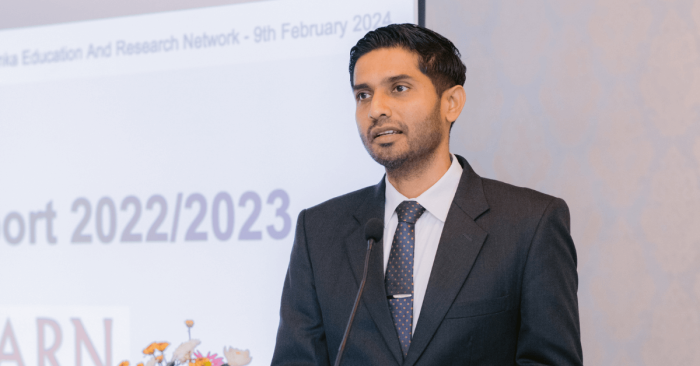
Following the awareness session, the event proceeded to the organisation’s annual general meeting. It began with a review of LEARN’s performance the past year, delivered by Prof. Ragel, who remarked, “It was a successful one with many activities and significant achievements.” He proceeded to share that alongside developing its infrastructure and services, the organisation also intensified its capacity-building endeavours. Traditionally, these were focused solely on upskilling engineers from member institutions. But now the scope of these initiatives has broadened to include academic staff with the NREN organising training sessions on topics such as LMS systems for their benefit. This commitment to capacity building is set to continue, with the AIDE program slated as the inaugural initiative for the current year.
At its core, LEARN’s membership continues to climb steadily as it now serves nearly 60 members. Additionally, with over 130 fibre connections (including backup lines) established, The organisation is actively exploring avenues to enhance its service offerings. This commitment is exemplified by its negotiations with Zoom to continue offering the service at concessionary rates. This is a notable feat that it achieved by working alongside its regional counterparts. Moving forward, Prof. Ragel shared that the lessons from this successful deployment will be applied to offer member institutions more services at concessionary rates. Moving forward, he emphasised that the organisation remains committed to empowering Sri Lankan academia by partnering with regional and international entities to ensure mutual advancement and collectively empowering academics everywhere.
LEARN’s equitable vision for the future
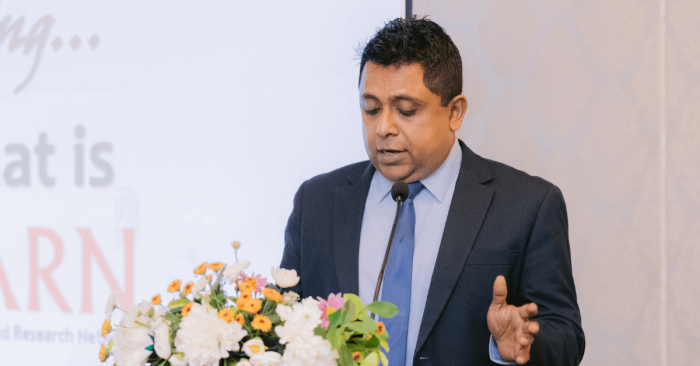
Returning to the stage, Dr. Bandaranayake’s address at the LEARN Annual General Meeting outlined the organisation’s vision for the future. Central to its vision is the principle of “Equity for all,” envisioning a future where accessible high-speed network infrastructure fosters equality in Sri Lankan academia. Dr. Bandaranayake emphasised, “By providing secure high-speed connectivity, we aim to eliminate systemic barriers and ensure equal opportunities for all.” He reiterated the organisation’s commitment to providing a wider variety of services at affordable rates, underscoring the organisation’s dedication to equitable access for its members. In alignment with this vision, LEARN’s future roadmap encompasses several strategic initiatives:
- Digital Transformation Proposal: A USD 72.7 million proposal seeks external funding for the comprehensive digital transformation of the entire State Higher Education sector. This includes developing the LEARN Fiber Network for affordable and superior connectivity and upgrading IT infrastructure across state higher education institutes. Thus facilitating their overall digital transformation.
- LEARN BRIDGE (Broadening Research, Innovation and Development through Grants and External engagements) Initiative: This multifaceted strategy aims to diversify funding sources, reduce reliance on member contributions, elevate LEARN’s international profile, and establish partnerships with leading international institutions. While securing international grants for its initiatives, the plan also involves the organisation competing to secure projects where it can leverage its expertise to solve regional and global issues.
- AI in Higher Education: LEARN is dedicated to empowering educators to embrace AI within Higher Education. As part of these efforts, the AIDE project will conduct a series of workshops in Kandy from March 11th to 15th, which the NREN will facilitate. This innovative educational initiative conducted by the UNESCO Chair at the Asia Pacific University (APU) in Malaysia incorporates Generative AI to elevate teaching and learning experiences. Its commitment to AI in Higher Education is further evident through initiatives such as the Educational AI Readiness Evaluation (eAIRE) programme and the ongoing feasibility study for the Sri Lanka AI Supercomputing Initiative (SLASI).
- Virtual University: LEARN aims to create a Virtual National Platform addressing HR needs for both local and global industries. The platform will provide a spectrum of educational programmes, including long-term, short-term, micro degrees, and certifications, responding promptly to the increasing demands of industries. Delivered by seasoned academics from member institutions, these programmess will leverage existing and future facilities, incorporating limited hands-on learning experiences. By providing the necessary IT infrastructure, LEARN seeks to enable the realisation of a seamless “Learn anytime, anywhere” concept, both online and in physical learning environments.
From its beginnings as a trailblazer in Sri Lanka’s internet landscape to its current role as a prominent figure in research and higher education, LEARN has consistently shown its ability to adapt and innovate. Looking back on a fruitful year marked by notable accomplishments and a growing membership base, it is well-positioned to continue its journey of transformation. Guided by the principle of “Equity for all,” The NREN aims to ensure everyone in Sri Lankan academia enjoys equal opportunities to succeed. With this vision in mind, it plans to develop its infrastructure and strengthen strategic partnerships to create an environment where everyone can thrive. As LEARN moves forward, its dedication to fairness, innovation, and collaboration remains unwavering, ensuring that its legacy of success benefits future generations of Sri Lankan academics.
